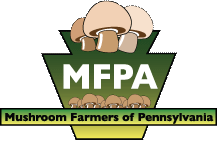
Environmental Importance l Nutritional Importance l Farm Profile l ACRE
Mushrooms Can Help Prevent Breast Cancer in Older Women
Common White button mushrooms beneficial, even when cooked
White button mushrooms can help prevent breast cancer by suppressing estrogen production in the body, according to a study led by researchers at City of Hope. Their preventive effect is most significant on post-menopausal women, as described in their study published in the December 15 issue of Cancer Research.
“We got the idea to look at mushrooms because we know that synthetic aromatase inhibitors can prevent breast cancer recurrence,” said Shiuan Chen, Ph.D., director of the Department of Surgical Research at City of Hope, and lead author of the study. Aromatase is the enzyme that helps the body make estrogen.
Since about 60 percent of premenopausal women and 75 percent of postmenopausal women have breast cancers that need estrogen to grow, controlling estrogen levels can help limit or prevent cancer growth. The effect is greater in postmenopausal women because they have lower circulating estrogen levels, and their estrogen production is controlled locally by tissues rather than by their brains.
The researchers found that out of seven vegetable extracts, mushrooms had the most effective anti-aromatase effect due to one phytochemical: conjugated linoleic acid. They were surprised to find that mushrooms contain conjugated linoleic acid, a compound that has previously been found to have anti-cancer properties, because it is mainly present in animal-based foods.
Celery was found to have a moderate effect, and green onion, carrot, bell pepper, broccoli and spinach extracts did not have a significant effect on reducing aromatase levels. The group then tested other mushrooms and found that while White stuffing mushrooms had the strongest effect, shiitake, White button, Portobello, Crimini and baby button mushrooms also had significant inhibitory effects on aromatase, even when cooked.
After confirming the presence of anti-aromatase chemicals in White button mushrooms, the researchers used laboratory and mouse studies to confirm that the anti-aromatase compounds stopped the growth of breast cancer cells. They found that mice that were fed mushroom extract had a 58 percent reduction in breast tumor growth.
Chen said the research team is now carrying out similar research on the effect of anti-aromatase compounds in food on prostate cancer. They are also planning a clinical trial to test the effect of mushrooms on estrogen levels in women.
“The idea of exploring foods for cancer prevention is very important, because prevention is much better than treating a disease,” Chen said. “You don’t need a strong effect to cause cancer prevention. Eating 100 grams [about 3.5 ounces] or even less of mushrooms per day could have an effect on preventing new breast cancers.”
Other researchers included Sei-Ryang Oh, Ph.D., Sheryl Phung, M.S., Gene Hur, B.S., Jing Jing Ye, B.S., Sum Ling Kwok, M.S., Lynn Adams, Ph.D. and Dudley Williams, Ph.D., all of City of Hope, as well as Gayle Shrode, Ph.D. and Martha Belury, Ph.D. of The Ohio State University.
About City of Hope
City of Hope is a leading research and treatment center for cancer, diabetes and other life-threatening diseases. Designated as a Comprehensive Cancer Center, the highest honor bestowed by the National Cancer Institute, and a founding member of the National Comprehensive Cancer Network, City of Hope's research and treatment protocols impact care throughout the nation. Founded in 1913, City of Hope is a pioneer in the fields of bone marrow transplantation and genetics and shares its scientific knowledge with medical centers locally and globally, helping patients battling serious diseases. For more information, visit www.cityofhope.org.

